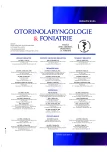Neonatal hearing screening in Olomouc region: failure analysis
Authors:
H. Hořáková; J. Heřman; Richard Salzman
Authors‘ workplace:
Klinika otorinolaryngologie a chirurgie hlavy a krku FN a LF Olomouc
Published in:
Otorinolaryngol Foniatr, 69, 2020, No. 3, pp. 127-130.
Category:
Original Article
Overview
Introduction: Hearing impairment is considered the most serious sensory handicap, which hinders incorporation of the affected person into majority society. Only functional area-wide screening may lead to detection of the defect soon enough. Without it, the deficit may be discovered after third year of age when delayed development of speech becomes apparent. Area-wide neonatal hearing screening in the Czech Republic has been carried out only in Moravskoslezsky, Kralovehradecky and Pardubicky regions until recently.
Methods: Results of neonatal hearing screening in 1-6/2019 in Olomouc region were evaluated and analysis of shortcommings was done. We explored the cases when rescreening was not done by interviewing parents by telephone.
Results: In total 3001 children were born in Olomouc region from January to June 2019, screening was done in 2901 of them (96.67%). Otoacoustic emission were not recorded or the test was not performed in 161 neonates (5.37%), majority of those not performed was caused by breakdown of a device and lack of a substitute. These were sent for rescreening. Only 111 (68.94%) came, and from these 106 had emissions present bilaterally and five unilaterally. Rescreening was not done in 50 children. Some of them actually had the examination done, but by a doctor, who does not send results to the regional center.
Conclusion: Expected number of children with bilateral hearing impairment was not dicsovered in Olomouc region in first half-year of 2019, some neonates have not underwent screening because of lack of a substitute device and attandace of resreening was not good, but part of this problem is due to bad transmition of results in the region.
Keywords:
Neonates – otoacoustic emissions – hearing screening – regional organisation
Sources
1. Formánek, M., Walderová, R., Formánková, D., et al.: Analýza výsledků screeningu sluchu novorozenců v Moravskoslezském kraji v roce 2017 a 2018. Otorinolaryngol Foniatr, 68, 2019, 3, s. 150–156.
2. Komínek, P., Chrobok, V., Zeleník, K., et al.: Novorozenecký screening sluchu – význam, současný stav v ČR. Čas Lék čes, 156, 2017, 4, s. 173–177.
3. Chrobok, V., Dršata, J., Janouch, M., et al.: Nutná spolupráce otorinolaryngologa, neonatologa a pediatra v novorozeneckém screeningu sluchu. Vox pediat, 17, 2017, 1, s. 33–35.
4. Chrobok, V., Dršata, J., Janouch, M., et al.: Příručka pro praxi: Screening sluchu novorozenců. Schváleno výborem České společnosti otorinolaryngologie a chirurgie hlavy a krku ČLS JEP, 2019.
5. MZ ČR. Metodický pokyn k zajištění celoplošného novorozeneckého screeningu sluchu a následné péče. Věstník MZ ČR 2012, 7, s. 18–19.
6. Počet narozených dětí v Olomouckém kraji – data Českého statistického úřadu. Dostupné z URL: https://www.czso.cz/csu/xm/demograficky-vyvoj-v-olomouckem-kraji-v-1-az-2-ctvrtleti-2019?fbclid=IwAR1SUenIorgSz6bFUON5sIqpRs33hVjjs4svYS-VAWa8ECOHW-LiFpT3EME
7. World Health Organization. Newborn and infant hearing screening: current issues and guiding principles for action. Ženeva: WHO, 2009.
Labels
Audiology Paediatric ENT ENT (Otorhinolaryngology)Article was published in
Otorhinolaryngology and Phoniatrics

2020 Issue 3
Most read in this issue
- Orální probiotika
- Biological importance and development of upper respiratory tract microbiome
- The benefit of magnetic resonance in diagnosis of Ménière's disease
- Tracheostomy in children - a 7-year experience at Department of Otorhinolaryngology and Head and Surgery at University Hospital Hradec Králové
